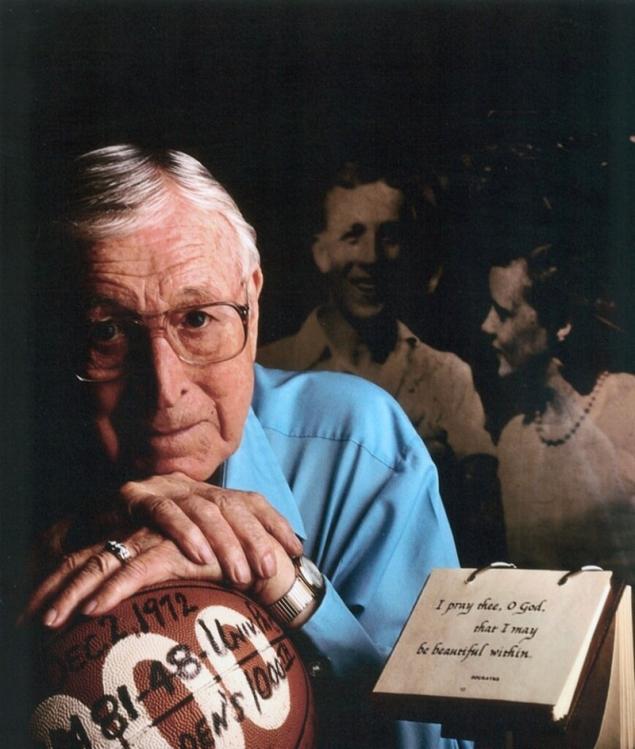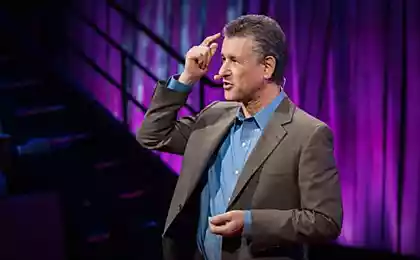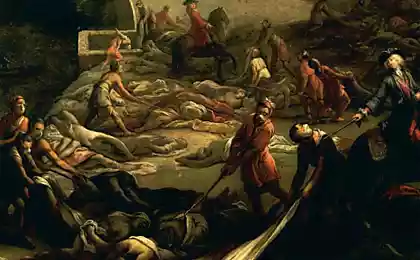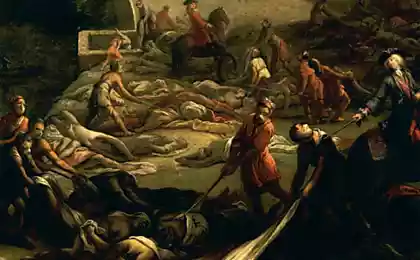517
John wooden: Difference between winning and success
With wise simplicity coach John wooden's definition of success and encourages us to seek the best within ourselves.
0:11 I made up my own definition of success in 1934 when I was teaching school South of the Bund in Indiana. Being a bit disappointed or probably in error due to the fact that parents expect from their children only fives and fours. They believed that the Troika is normal for the neighborhood kids because all the neighborhood kids in the middle. But they were't satisfied when their own -- a feeling that either the teacher has failed, or students. And that's not right. The good Lord in his infinite wisdom didn't create us all equal at least in terms of mind, we are more equal in size and appearance. Not everyone can get 5 or 4, and I was not like this grading system.

0:54 I knew that the alumni of various schools back in the distant 30-ies judged coaches and athletic teams. If you beat them all, you were considered to be reasonably successful. But not quite. Because I found out that was the year when the University UCLA did not lose a single game. But it turns out that we have won every game with the difference that we expected from some alumni. And quite often I... (Laughter) ...quite often it seemed to me that they belonged to the assumptions are too materialistic. But in the 30s this was true and I understood it, although I didn't approve of her. And I wanted to find a solution that made me a better teacher, and which would have provided students — whether in the gym or in class, English is something that they would aim, instead of a simple high marks in the classroom or more points in the competition.
1:51 for a long time I pondered the decision and realized that I need my own definition of success. I thought it would help. And I knew how Mr. Webster described it: as the accumulation of wealth or the desire for power, or respect, or something like that. Valuable achievements, maybe, but in my opinion, they are not necessarily indicators of success. So I wanted to your criteria.
2:14 I grew up on a small farm in southern Indiana. And father tried to teach me and my brothers that you should never try to be better than others. And I'm sure he did, I didn't -- didn't -- well, sometimes, I believe, from the depths of my memory, these thoughts emerge many years later. Never try to be better than someone else, always learn from others. Never cease to strive to be better than you can. If you swallow, will involve or attended to things over which you have no control, it will adversely affect something over which you have control. Somehow I came across this simple verse that said, "Before the Lord in confession the soul is bent, zamalivaya sin. “Failed!” — exclaimed. The Lord said, "Try as I might — and this is your" success".
3:01 With such things, I have formulated my definition of success. Which looks like this: state of mind derived through self-satisfaction in knowing that you made every effort that was able. I believe that's true. If you try to do something to the limit, to try to change the situation in which you are, then it will be a success. I don't think others can judge that. I think it's like character and reputation. Your reputation is how you are perceived, your character is who you really are. I think the character is much more important than what you seem. Would you like to a good it was both. But they are not necessarily similar. This idea I tried to convey to young people.
3:43 I love to teach, and as noted by the previous speaker that I enjoy poetry, and immersed in her world. The poems helped me, I think, be better than I ever could be. I know I'm not who I could become and not who followed. I think I'd be different person if my life had no poetry. One of them said:
4:06 "No words and requests, which could Give knowledge, so young, But the books are any good, And only the teacher will teach the lesson."
4:18 It made an impression on me in the 1930s. And, to the extent possible, I tried to follow these lines, no matter the sport or English lessons. I love poetry and always had an interest in it. Maybe due to the fact that my father read to us before bed. Coal oil lamp -- we didn't have electricity in the house on the farm. And the father would read poetry to us, and I've always liked. And so I learned this poem, and then another. Someone asked the teacher why she is teaching. And she, after a short while, said she wanted to think about. Then she came back and said:
5:01 "people ask Me why I teach, and I reply: "Where could I find such splendid company?" Here before me sits a statesman, strong, unbiased, wise. Another eloquent Daniel Webster. A doctor sits beside him, whose quick steady hand may mend a bone or stop the bleeding. And there a Builder. Upward rise the arch of a Church he builds, wherein that Minister may speak the word of God and lead a stumbling soul to touch the Christ. All together: teachers, farmers, merchants, laborers. Who builds, vote, pray and work for a great future. And I will say, I may not see the Church and hear the word or eat the food their hands may grow. Well, maybe. Maybe someday I'll say, “I knew him once, and he was weak, or strong, or bold or proud or gay. I knew him when he was a child.” People ask me why I teach and I reply: "Where could I find such splendid company?""
5:55 I think that this is the profession of a teacher, it's true, because in the class so a lot of guys. And I thought of my youngsters at UCLA -- 30 — some attorneys, 11 dentists and doctors, many, many teachers and other professions. Very nice to watch their progress. I've always tried to convey to students that they are here primarily for education. In the second place was basketball because it was worth it, and they had little time to public Affairs, but you give public Affairs a certain priority before the first two, and you're not going to do anything for too long. Now, these ideas I tried to convey to the youth who was under my supervision.
6:38 I had 3 rulesthat I adhered to all the time. I learned these prior to coming to UCLA and decided that they are very important. One of them is never be late. Never. Then I said -- I had -- players, if we were leaving for somewhere, had to be neat and clean. There was a time when I made them wear blazers, shirts and ties. Then I saw our Chancellor coming to school in jeans and a turtleneck, and thought that no longer make sense in jackets. So I let them — they just need to be neat and clean. One of my greatest players that you probably heard of him, bill Walton. He hurried to the bus, we were leaving for somewhere to play. He was slovenly dressed, and I didn't let him go. He missed the bus, he had to go home to freshen up and to go to the airport. I was a pedant, I believed it. I believe in the importance of time. You should be on time. But I thought in training we start on time and finish on time. Players should not be held after training.
7:47 When I talk on courses for coaches, I often tell young coaches, and there are going to more or less young, aspiring coaches. Most of them are young and probably recently married. And I tell them,"don't run practices late. Because you'll go home in a bad mood. And a married man to go home in a bad mood. When you get older, it won't make a difference, but..."
8:09 (Laughter)
8:14 so, I appreciate the time. Start on time and finish on time. Another rule was, not a pejorative. One word of profanity and you're free for the day. And if it is during the game, you will sit on the bench. Third rule: never criticize a teammate. I didn't want to, because it paid the money to me. It's my job. I pay for it, badly, but pay. Not like the current coaches, of course not. It's a little different. These three rules I strictly adhered to all the time. And they moved me from my father. That he once tried to teach me and my brothers.
8:57 In the end I got the pyramid, there's no time to talk about this in detail. But she helped me become a better teacher. Looks like this.
In the pyramid blocks.
And the cornerstones are: zeal, enthusiasm, hard work and love for what you do.
Lifting upwards. According to my definition of success. Top right — faith and patience.
And I'll tell you: whatever you do, please be patient. That would be something to do to endure. We often talk about the impatience of our youth. The way it is. They want to change everything at once. They think all change is progress. As we get older, it seems to be down. And we forget that without change there is no progress. So you must have patience.
I believe that we need faith. I believe that we must sincerely believe. And not just saying the words in vain, to believe that things will work out if we do that it should. I think we tend to believe that things will turn out the way we want. But we do not make the necessary efforts to ensure that our wishes become reality. I worked on this problem for about 14 years, and I think it made me a better teacher. But it all revolved around the definition of success.
10:18 Remember, a few years ago, there was a judge in Major League baseball, whose name was George Moriarty. He spelled Moriarty with only one 'i'. Never seen that before, but he did. Great baseball players — they're very perceptive about those things, and they noticed that his name is only one letter "i". Surprised how many also told him that that was one more than in his mind, at different times.
10:43 (Laughter)
10:45 But he wrote the thing, similar in meaning to my pyramid. He called it "the Road Ahead or the Road Behind."
"Sometimes Fate must be smiling over us when we denounce them and insist that we can't win, because fates. Though there is an old expression that we win or lose within ourselves. The shining trophies on our shelves can never win tomorrow's game. We have within us the realization that there is always a chance. But if we can't give everything to win, we just could not resist the challenge to give everything without sparing anything, until not to win the game. Or show strength of character, breaking where others stop. Don't give up. Nature brings the victory. Dream about what the goal is found. Hope in the moment when all hopes destroyed. Prayer in a time when hope has left us. Without fear to fall if you lose. If we fought bravely, who dare to rebuke that person gave whatever was in his power. To give everything to win, so it's almost win. And so the fates are seldom wrong, in ourselves. We open the gate leading to the road ahead or the road behind us".
11:51 it sounds Like the words my father said: "don't whine, don't complain, don't make excuses. Just get out there and do what you must, to the maximum of their capabilities. And nobody can do this anymore". I wanted to talk about... my opponents don't talk about it — I didn't mention victory. Never mention winning. I mean, what can you lose when you score more points in the game. And you can win by scoring less than the opponent. Sometimes I thought so, from time to time. I wanted the players walked with his head held high after the game. I said that when the game is over and you see someone who does not know the account, it doesn't have to guess at your behavior, someone who has more scoring, you the enemy, or he you.
12:42 Here's the thing: if you are trying to do something better than usual, the result will not keep itself waiting. Not necessarily that you will get what you want, but the result will be what it needs. And only you can decide will you or not. That's what I wanted from them most. As time went on and I learned a lot, and got better and better, if to judge by results. But I didn't want the result on the scoreboard was the goal of the game. I think one great philosopher said -- no, no, Cervantes. Cervantes said,"the Journey is better than the end". And I love this statement. I think what is important is the way to go. Sometimes when you expect the devastation. But in achieving the goal all the joy. As a coach, I considered training as a journey where the end game would be. The end result. I sat in the stands and watch the players and evaluate their work over the past week. And again we come to the fact that the players came to understanding that they made every effort to achieve the maximum.
14:03 Sometimes people ask me who was the best player or what was the best team. I've never been able to answer when it comes to personalities. Someone asked me recently: "Suppose you have the opportunity could make the perfect player, what would you want?" I said I'd like him to know that he is here primarily for education, so he was a good student, really knew, what it is in UCLA. Oh, and just so he could play. To understand that usually wins Championships in the defense, so he needs to work hard on defense. But I wish he would play offense too. And so he could pass and pass. so I was looking for an opportunity to pass the ball and not shoot at every opportunity. And so he could pass and would pass.
14:51 (Laughter)
14:52 the players were able to pass the ball, but not pass partners. And there were those who did pass, but pass they could not.
14:56 (Laughter)
15:00 So they had to shoot from the outside. And from the middle distance.
15:05 (Laughter)
15:08 So they were able to rebound under the boards. Take, for example, Keith Wilkes. He came in the parameters, and not only he, but his I remembered, because he was trying to become the best in all categories.
15:27 In his book "they call Me coach" I think of two players whose game has brought me a lot of satisfaction that came closer than anyone to the ceiling of its possibilities: the first name is Conrad Burke, second — Doug McIntosh. When I saw them as freshmen, on our freshmen team -- freshmen couldn't play varsity when I taught. I thought, "my God, if those two, or even one of them," — and they were not peers, but each of them, I thought, "Wow, if he ever gets into varsity, it must be, we have it pretty bad, if he is good for her." And you know one of them was a starting player for a season and a half. And the second the following year played 32 minutes in the final match of the national championship, he played amazing. And the following year went out in the starting five in the winning team. But I thought he'd never play. So those are the things that give you great joy and a real pleasure. Neither the one nor the other does not have a good shot. But they had outstanding shooting percentages, because they did not seek to quit. And none of them had a decent jump, but they held their ground fairly well, it was the same with rebounds. They believed that every shot would be missed. I have had many players who stood and waited for a miss, and then fled for the selection, but it was too late. And ahead of them by someone else. And they were not quick, but well-practiced in their position, played balanced. They played pretty good defense. So they had qualities that -- they came close to what can be called their full potential as any players I ever had. Thus, I believe that they have been successful as Lewis Alcindor or bill Walton, or many other players — among them there were many outstanding players.
17:17 Perhaps, enough chit-chat? I said, when you see that man over there, you need to call it a night.
17:24 (Laughter) (Applause)published
https://vk.com/video_ext.php?oid=-41161680&id=171884370&hash=7f568fb62a83bd6e
P. S. And remember, only by changing their consumption — together we change the world! ©
Source: www.ted.com/talks/john_wooden_on_the_difference_between_winning_and_success/transcript?language=ru
0:11 I made up my own definition of success in 1934 when I was teaching school South of the Bund in Indiana. Being a bit disappointed or probably in error due to the fact that parents expect from their children only fives and fours. They believed that the Troika is normal for the neighborhood kids because all the neighborhood kids in the middle. But they were't satisfied when their own -- a feeling that either the teacher has failed, or students. And that's not right. The good Lord in his infinite wisdom didn't create us all equal at least in terms of mind, we are more equal in size and appearance. Not everyone can get 5 or 4, and I was not like this grading system.

0:54 I knew that the alumni of various schools back in the distant 30-ies judged coaches and athletic teams. If you beat them all, you were considered to be reasonably successful. But not quite. Because I found out that was the year when the University UCLA did not lose a single game. But it turns out that we have won every game with the difference that we expected from some alumni. And quite often I... (Laughter) ...quite often it seemed to me that they belonged to the assumptions are too materialistic. But in the 30s this was true and I understood it, although I didn't approve of her. And I wanted to find a solution that made me a better teacher, and which would have provided students — whether in the gym or in class, English is something that they would aim, instead of a simple high marks in the classroom or more points in the competition.
1:51 for a long time I pondered the decision and realized that I need my own definition of success. I thought it would help. And I knew how Mr. Webster described it: as the accumulation of wealth or the desire for power, or respect, or something like that. Valuable achievements, maybe, but in my opinion, they are not necessarily indicators of success. So I wanted to your criteria.
2:14 I grew up on a small farm in southern Indiana. And father tried to teach me and my brothers that you should never try to be better than others. And I'm sure he did, I didn't -- didn't -- well, sometimes, I believe, from the depths of my memory, these thoughts emerge many years later. Never try to be better than someone else, always learn from others. Never cease to strive to be better than you can. If you swallow, will involve or attended to things over which you have no control, it will adversely affect something over which you have control. Somehow I came across this simple verse that said, "Before the Lord in confession the soul is bent, zamalivaya sin. “Failed!” — exclaimed. The Lord said, "Try as I might — and this is your" success".
3:01 With such things, I have formulated my definition of success. Which looks like this: state of mind derived through self-satisfaction in knowing that you made every effort that was able. I believe that's true. If you try to do something to the limit, to try to change the situation in which you are, then it will be a success. I don't think others can judge that. I think it's like character and reputation. Your reputation is how you are perceived, your character is who you really are. I think the character is much more important than what you seem. Would you like to a good it was both. But they are not necessarily similar. This idea I tried to convey to young people.
3:43 I love to teach, and as noted by the previous speaker that I enjoy poetry, and immersed in her world. The poems helped me, I think, be better than I ever could be. I know I'm not who I could become and not who followed. I think I'd be different person if my life had no poetry. One of them said:
4:06 "No words and requests, which could Give knowledge, so young, But the books are any good, And only the teacher will teach the lesson."
4:18 It made an impression on me in the 1930s. And, to the extent possible, I tried to follow these lines, no matter the sport or English lessons. I love poetry and always had an interest in it. Maybe due to the fact that my father read to us before bed. Coal oil lamp -- we didn't have electricity in the house on the farm. And the father would read poetry to us, and I've always liked. And so I learned this poem, and then another. Someone asked the teacher why she is teaching. And she, after a short while, said she wanted to think about. Then she came back and said:
5:01 "people ask Me why I teach, and I reply: "Where could I find such splendid company?" Here before me sits a statesman, strong, unbiased, wise. Another eloquent Daniel Webster. A doctor sits beside him, whose quick steady hand may mend a bone or stop the bleeding. And there a Builder. Upward rise the arch of a Church he builds, wherein that Minister may speak the word of God and lead a stumbling soul to touch the Christ. All together: teachers, farmers, merchants, laborers. Who builds, vote, pray and work for a great future. And I will say, I may not see the Church and hear the word or eat the food their hands may grow. Well, maybe. Maybe someday I'll say, “I knew him once, and he was weak, or strong, or bold or proud or gay. I knew him when he was a child.” People ask me why I teach and I reply: "Where could I find such splendid company?""
5:55 I think that this is the profession of a teacher, it's true, because in the class so a lot of guys. And I thought of my youngsters at UCLA -- 30 — some attorneys, 11 dentists and doctors, many, many teachers and other professions. Very nice to watch their progress. I've always tried to convey to students that they are here primarily for education. In the second place was basketball because it was worth it, and they had little time to public Affairs, but you give public Affairs a certain priority before the first two, and you're not going to do anything for too long. Now, these ideas I tried to convey to the youth who was under my supervision.
6:38 I had 3 rulesthat I adhered to all the time. I learned these prior to coming to UCLA and decided that they are very important. One of them is never be late. Never. Then I said -- I had -- players, if we were leaving for somewhere, had to be neat and clean. There was a time when I made them wear blazers, shirts and ties. Then I saw our Chancellor coming to school in jeans and a turtleneck, and thought that no longer make sense in jackets. So I let them — they just need to be neat and clean. One of my greatest players that you probably heard of him, bill Walton. He hurried to the bus, we were leaving for somewhere to play. He was slovenly dressed, and I didn't let him go. He missed the bus, he had to go home to freshen up and to go to the airport. I was a pedant, I believed it. I believe in the importance of time. You should be on time. But I thought in training we start on time and finish on time. Players should not be held after training.
7:47 When I talk on courses for coaches, I often tell young coaches, and there are going to more or less young, aspiring coaches. Most of them are young and probably recently married. And I tell them,"don't run practices late. Because you'll go home in a bad mood. And a married man to go home in a bad mood. When you get older, it won't make a difference, but..."
8:09 (Laughter)
8:14 so, I appreciate the time. Start on time and finish on time. Another rule was, not a pejorative. One word of profanity and you're free for the day. And if it is during the game, you will sit on the bench. Third rule: never criticize a teammate. I didn't want to, because it paid the money to me. It's my job. I pay for it, badly, but pay. Not like the current coaches, of course not. It's a little different. These three rules I strictly adhered to all the time. And they moved me from my father. That he once tried to teach me and my brothers.
8:57 In the end I got the pyramid, there's no time to talk about this in detail. But she helped me become a better teacher. Looks like this.
In the pyramid blocks.
And the cornerstones are: zeal, enthusiasm, hard work and love for what you do.
Lifting upwards. According to my definition of success. Top right — faith and patience.
And I'll tell you: whatever you do, please be patient. That would be something to do to endure. We often talk about the impatience of our youth. The way it is. They want to change everything at once. They think all change is progress. As we get older, it seems to be down. And we forget that without change there is no progress. So you must have patience.
I believe that we need faith. I believe that we must sincerely believe. And not just saying the words in vain, to believe that things will work out if we do that it should. I think we tend to believe that things will turn out the way we want. But we do not make the necessary efforts to ensure that our wishes become reality. I worked on this problem for about 14 years, and I think it made me a better teacher. But it all revolved around the definition of success.
10:18 Remember, a few years ago, there was a judge in Major League baseball, whose name was George Moriarty. He spelled Moriarty with only one 'i'. Never seen that before, but he did. Great baseball players — they're very perceptive about those things, and they noticed that his name is only one letter "i". Surprised how many also told him that that was one more than in his mind, at different times.
10:43 (Laughter)
10:45 But he wrote the thing, similar in meaning to my pyramid. He called it "the Road Ahead or the Road Behind."
"Sometimes Fate must be smiling over us when we denounce them and insist that we can't win, because fates. Though there is an old expression that we win or lose within ourselves. The shining trophies on our shelves can never win tomorrow's game. We have within us the realization that there is always a chance. But if we can't give everything to win, we just could not resist the challenge to give everything without sparing anything, until not to win the game. Or show strength of character, breaking where others stop. Don't give up. Nature brings the victory. Dream about what the goal is found. Hope in the moment when all hopes destroyed. Prayer in a time when hope has left us. Without fear to fall if you lose. If we fought bravely, who dare to rebuke that person gave whatever was in his power. To give everything to win, so it's almost win. And so the fates are seldom wrong, in ourselves. We open the gate leading to the road ahead or the road behind us".
11:51 it sounds Like the words my father said: "don't whine, don't complain, don't make excuses. Just get out there and do what you must, to the maximum of their capabilities. And nobody can do this anymore". I wanted to talk about... my opponents don't talk about it — I didn't mention victory. Never mention winning. I mean, what can you lose when you score more points in the game. And you can win by scoring less than the opponent. Sometimes I thought so, from time to time. I wanted the players walked with his head held high after the game. I said that when the game is over and you see someone who does not know the account, it doesn't have to guess at your behavior, someone who has more scoring, you the enemy, or he you.
12:42 Here's the thing: if you are trying to do something better than usual, the result will not keep itself waiting. Not necessarily that you will get what you want, but the result will be what it needs. And only you can decide will you or not. That's what I wanted from them most. As time went on and I learned a lot, and got better and better, if to judge by results. But I didn't want the result on the scoreboard was the goal of the game. I think one great philosopher said -- no, no, Cervantes. Cervantes said,"the Journey is better than the end". And I love this statement. I think what is important is the way to go. Sometimes when you expect the devastation. But in achieving the goal all the joy. As a coach, I considered training as a journey where the end game would be. The end result. I sat in the stands and watch the players and evaluate their work over the past week. And again we come to the fact that the players came to understanding that they made every effort to achieve the maximum.
14:03 Sometimes people ask me who was the best player or what was the best team. I've never been able to answer when it comes to personalities. Someone asked me recently: "Suppose you have the opportunity could make the perfect player, what would you want?" I said I'd like him to know that he is here primarily for education, so he was a good student, really knew, what it is in UCLA. Oh, and just so he could play. To understand that usually wins Championships in the defense, so he needs to work hard on defense. But I wish he would play offense too. And so he could pass and pass. so I was looking for an opportunity to pass the ball and not shoot at every opportunity. And so he could pass and would pass.
14:51 (Laughter)
14:52 the players were able to pass the ball, but not pass partners. And there were those who did pass, but pass they could not.
14:56 (Laughter)
15:00 So they had to shoot from the outside. And from the middle distance.
15:05 (Laughter)
15:08 So they were able to rebound under the boards. Take, for example, Keith Wilkes. He came in the parameters, and not only he, but his I remembered, because he was trying to become the best in all categories.
15:27 In his book "they call Me coach" I think of two players whose game has brought me a lot of satisfaction that came closer than anyone to the ceiling of its possibilities: the first name is Conrad Burke, second — Doug McIntosh. When I saw them as freshmen, on our freshmen team -- freshmen couldn't play varsity when I taught. I thought, "my God, if those two, or even one of them," — and they were not peers, but each of them, I thought, "Wow, if he ever gets into varsity, it must be, we have it pretty bad, if he is good for her." And you know one of them was a starting player for a season and a half. And the second the following year played 32 minutes in the final match of the national championship, he played amazing. And the following year went out in the starting five in the winning team. But I thought he'd never play. So those are the things that give you great joy and a real pleasure. Neither the one nor the other does not have a good shot. But they had outstanding shooting percentages, because they did not seek to quit. And none of them had a decent jump, but they held their ground fairly well, it was the same with rebounds. They believed that every shot would be missed. I have had many players who stood and waited for a miss, and then fled for the selection, but it was too late. And ahead of them by someone else. And they were not quick, but well-practiced in their position, played balanced. They played pretty good defense. So they had qualities that -- they came close to what can be called their full potential as any players I ever had. Thus, I believe that they have been successful as Lewis Alcindor or bill Walton, or many other players — among them there were many outstanding players.
17:17 Perhaps, enough chit-chat? I said, when you see that man over there, you need to call it a night.
17:24 (Laughter) (Applause)published
https://vk.com/video_ext.php?oid=-41161680&id=171884370&hash=7f568fb62a83bd6e
P. S. And remember, only by changing their consumption — together we change the world! ©
Source: www.ted.com/talks/john_wooden_on_the_difference_between_winning_and_success/transcript?language=ru






















